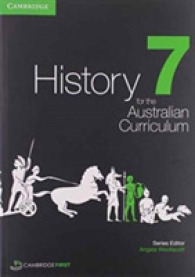- ホーム
- > 洋書
- > 英文書
- > Cinema / Film
Full Description
This work of theological film criticism provides an analysis of filmmaker Christopher Nolan's entire filmography, from Following (1998) to Oppenheimer (2023).
Though his films are noticeably lacking in representations of religion or references to God, Nolan's postsecular cinema is nevertheless worthy of our theological consideration, as it contains valuable theological and philosophical insights. Indeed, this is the central claim of Theology and the Films of Christopher Nolan: Christopher Nolan's films can and should be considered works of cinematic philosophical theology—they are doing theology and philosophy through the medium of film as they explore what it means to be human in relation to the transcendent. This book identifies the deep parallels and resonances between Nolan's films and the works of philosopher Paul Ricoeur and theologian St. Augustine. Like Nolan's cinema, Theology and the Films of Christopher Nolan is both intellectually stimulating and highly accessible, satisfying the interests of both scholars and popular audiences alike.
Contents
Foreword by Kutter Callaway
Acknowledgments
Introduction: Theology and Christopher Nolan
1. Following: Fallible Man
2. Memento: Memory, History, Forgetting
3. Insomnia: Finitude and Guilt
4. The Dark Knight Trilogy: The Symbolism of Evil
5. The Prestige: Oneself as Another
6. Inception: The Conflict of Interpretations
7. Interstellar: The Course of Recognition
8. Dunkirk: History and Truth
9. Tenet: Time and Narrative
10. Oppenheimer: Living Up to Death
Conclusion: Nolan's Cinematic Transcendence








